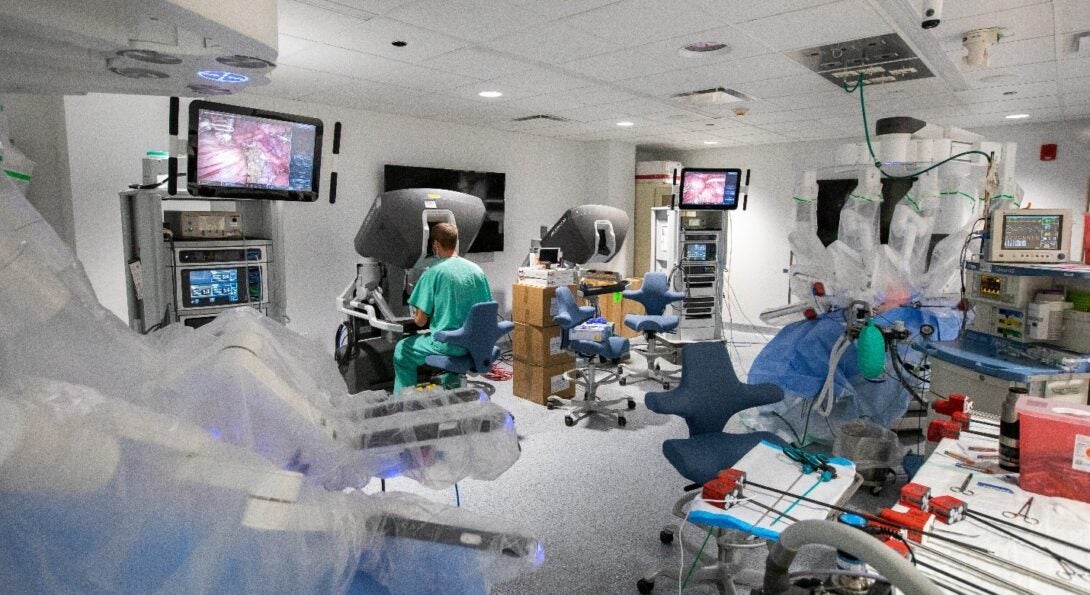Navigating ADPKD: Challenges in Transplant Access and Innovation

Each year, thousands of patients with kidney failure remain on the transplant waiting list, hoping for a life-saving donor match. The wait can stretch for years, with many enduring dialysis and declining health while hoping for an organ match.
However, not every patient is guaranteed approval even when a kidney becomes available. Certain medical conditions can complicate the transplant process, making it even harder for those to receive the care they need. One such condition is autosomal dominant polycystic kidney disease (ADPKD)—a disorder that causes the development of multiple fluid-filled cysts in the kidneys.
Though rare, this genetic disorder can create significant barriers to kidney transplantation, especially when surgery is a necessity for advanced ADKPD. “In most transplant programs, even modest signs of cyst development will lead to a rejection,” notes Dr. Stephen Bartlett, a transplant surgeon at UI Health.
However, UI Health stands apart from all the other centers with its advanced robotic surgical approaches, which enable surgeons to manage these complex procedures. “We have the latest generation of intuitive robots,” said Dr. Bartlett. “But, in the end, it’s not so much about the equipment—it’s about our surgeons’ expertise and surgical skills.”
What is ADPKD? Heading link
ADPKD is one of the most common genetic disorders. It is characterized by the development and progressive enlargement of fluid-filled cysts formed around the kidneys.
As the cysts grow, they cause the irritated kidneys to enlarge, which can lead to a gradual decline in kidney function.
Consider blood flow traveling through the kidney as traffic on a highway, with open lanes allowing for efficient travel. Similarly, healthy kidneys have clear pathways that allow blood to flow freely, enabling waste to be filtered and removed from the blood. As these cysts continue to grow, the blockage slows the traffic flow.
The cysts crowd out healthy kidney tissue, reducing the organ’s ability to filter the waste effectively. This disturbance in flow can result in high blood pressure, chronic pain, and complications such as kidney stones or urinary tract infections. As the disease progresses, kidney function may deteriorate to the point of failure, requiring dialysis or a transplant for survival. In addition, ADPKD can affect other organs, leading to problems such as liver cysts, brain aneurysms, or heart valve issues, further complicating a patient’s health.
Detecting ADPKD Heading link
While ADPKD is caused by genetic mutations, the severity and progression of the disease can vary widely among affected individuals within the same family.
But just how difficult is it to detect ADPKD? “Well, it is and it isn’t,” Dr. Bartlett said. “If either of your parents has it, there is a 50/50 chance you will inherit it.” This critical piece of knowledge provides descendants with a head start to begin treatment for ADPKD. This can be detected through ultrasound as early as one’s teenage years. The ultrasound display will offer real-time images of cysts’ presence, size, and quantity.
“However,” Dr. Bartlett states, “if you or your parents did not know they had ADPKD, then it is not obvious until your middle-aged years when symptoms arise.”
To complicate matters, in some early stages of ADPKD, kidney function can remain relatively stable despite the presence of cysts. This is because healthy nephrons, the kidney’s filtering units, compensate for those damaged by the cysts. As a result, standard kidney function tests used to measure how well they filter waste may show normal or only slightly reduced levels.
Eligibility for Transplant Surgery Heading link
Patients with ADPKD may be denied kidney transplantation due to various risk factors associated with their condition. The primary concerns include the size, amount, and complexity of the diseased kidneys, which can become massively enlarged, pressing against other organs.
This makes transplantation more demanding, as many centers require pre-transplant nephrectomy to remove the damaged kidneys.
Additionally, ADPKD patients often face higher surgical risks due to complications, including hemorrhaging, infections, and cyst ruptures. As a result, some centers may opt to deny these patients, as the increased risks and complications require more specialized care and resources.
However, UI Health remains at the forefront of surgical advancement in treating such difficult circumstances. “Our robotic surgery capabilities for ADPKD are a major innovation,” said Dr. Bartlett.
UI Health is at the Forefront of Innovation Heading link
As a leading transplant center, UI Health’s multidisciplinary team works seamlessly to guide patients through every stage of the transplant process, including utilizing their intuitive robotic surgical equipment. This level of advanced technology and expertise is unique to UI Health, setting it apart as the only center with such specialized care for complex transplant procedures.
“If someone is on dialysis with ADPKD, we now have the ability to remove the kidney robotically and put in a living donor kidney at the same time,” stated Dr. Bartlett. “With minimally invasive robotic incisions, we can remove the damaged kidney while simultaneously transplanting the other.”
Surgeons are able to remove enlarged kidneys and replace them with an incision only a couple of inches in length, ensuring patients receive a quicker recovery and rehabilitation. This feat enables UI Health’s remarkable transplant and nephrology teams to care for patients with advanced ADPKD.
The Results are in Heading link
For patients with ADPKD, the road to a life-saving kidney transplant can be fraught with obstacles. That is why it’s crucial for those affected to explore all available treatment options. At UI Health, patients can access a range of advanced solutions designed to manage ADPKD at every stage.
UI Health ensures that no patient is turned down through committed and individualized care. UI Health continues to lead in surgical precision and genetic research —offering patients a better quality of life.
If you are interested in a referral for a kidney transplant evaluation or would like more information about our program, please contact us or call 312.996.6771.